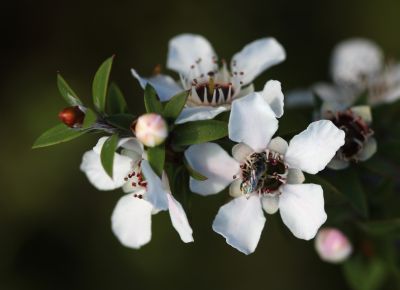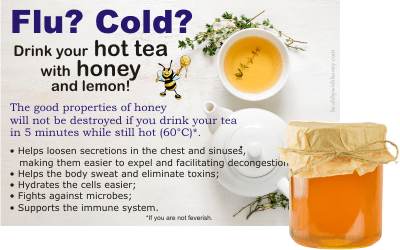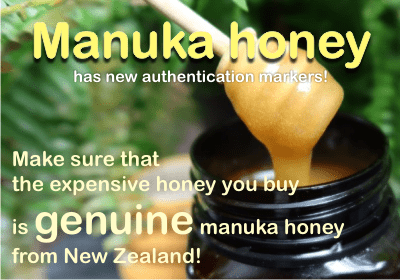Manuka honey is one of the most appreciated honey in the world. The taste is unique and its therapeutically properties makes it loved worldwide.
Why is this honey so appreciated and so healthy? As any other monofloral honey it brings the characteristics of the plant the nectar was harvested from, mainly its phytochemical components (such as Leptosperin), but manuka honey is so much researched and marketed more for its MGO (methylglyoxal) content – a substance with a powerful antimicrobial effect. It is said to kill Staphylococcus Aureus, Pseudomonas Aeruginosa, Helicobacter pylori, Clostridium difficile, Streptococcus pyogenes and others, but most important is that it may kill antibiotic resistant bacteria.
This means it is useful in killing harmful microorganisms in our body, especially ones that have gained resistance to our synthetic antibiotics. People with skin problems, digestive problems (such as ulcer), or with oropharyngeal infections use manuka honey with very good results.
So, what’s the bad news?
The weather. That’s the bad news. At least for this year.
The production of honey depends a lot on the quantity of nectar secreted in the flower, which is directly affected by weather conditions. And at the end of 2016, beginning of 2017 (a period considered to be a honey harvesting year), the weather has been against honey bees and beekeepers.
There have been wet, cold, and particularly windy conditions in New Zealand this summer, and this is the mother-country of manuka honey.
What do the big traders say?
Comvita
Comvita is among the first, the biggest and the most trustful manuka honey sellers. It’s my first recommendation. And they are honest enough to admit things don’t look good.
The company has an average honey crop of 974 tonnes. But in 2017 it expects only 380. This is less than half!
Their shares dropped $1.06 to $6.77, the lowest they’ve been since November 2015.
Here are some other numbers they offer:
Earnings in 2016: $17.1 million.
Expected earnings in 2017: between $5 million and $7 million in the year ending June 30.
This is going to also affect the production of Medihoney as well, as this is made of manuka honey.
Chairman Neil Craig said in a statement. “We also indicated for the first four months of the year, we had experienced tough trading conditions, with sales significantly lower than the prior year resulting from a slowdown in the New Zealand and Australian informal trade channels into China.”
“Although we do not have full visibility on our 2017 honey crop until April/May, the honey season has progressed to a point where we have enough evidence to suggest we are likely to see a 60 per cent shortfall in harvest expectations this season from our own apiary operations,” Chief executive Scott Coulter.
Should we worry?
Comvita’s chief executive Scott Coulter said they had been preparing for this type of scenario, buying manuka honey inventory from third party suppliers over the past 18 months, which gives it enough supply to meet demand for the next year.
“The very poor honey production this season reinforces the importance of being successful in our diversification and value add strategies,” he said. “This is an active ongoing process about which we expect to release more details over the next few months.” (BusinessDesk.co.nz)
So, should we worry? He is an executive, what can he say? Every company has ups and downs, they’ll manage to face the problem somehow. But will we have enough honey to buy?
As consumers we cannot afford to buy old honey. They may have supplies of honey, but this means is not fresh. Manuka honey is a different honey. Its MGO content changes in time, it may become higher or lower, its enzymes content (like in any other honey) changes, and if it’s even older than 2015 manuka honey may contain a higher quantity on tutin, a toxin which has lowered accepted levels since March 2015.
Which means we need fresh manuka honey for our health.
What shall we do?
Probably buy more honey, now. At least to have enough for the current treatment (UMF15+ and higher), and if you are eating it at breakfast, for a tasty nutritional supplement, than enough for a year (UMF5+ is recommended for breakfasts).
At the end of the year lots and lots of frauds are expected to appear, because the demand is increasing, and the real stuff will have probably run out.
Amazon still has it. For a list of trustful sellers, please see the list from here: Deciphering manuka honey: UMF15+, MGO400, 24+ Bio Active, KFactor16, TA. And LOTS OF FRAUDS.
Here are some suggestions that you can find at Amazon:
 And if you cannot find any manuka honey left at your usual supplier, than you should consider another honey. A very high content of MGO, even way much higher is found in berringa honey from Australia, some say it is better than manuka honey from New Zealand. Probably that’s why it is called “super manuka honey”! Worth trying.
And if you cannot find any manuka honey left at your usual supplier, than you should consider another honey. A very high content of MGO, even way much higher is found in berringa honey from Australia, some say it is better than manuka honey from New Zealand. Probably that’s why it is called “super manuka honey”! Worth trying.
And, of course, the other amazing healthy honeys we have on this planet, like sidr honey, tualang honey, gelam honey, revamil or neem honey. You will find one of them and you will definitely not be sorry! 🙂
Related articles:
What kills Staphylococcus aureus? Does manuka honey kill MRSA?
Can diabetics eat MANUKA HONEY?
Manuka honey – THE BEST to treat wounds, burns, skin infections.
————
References:






